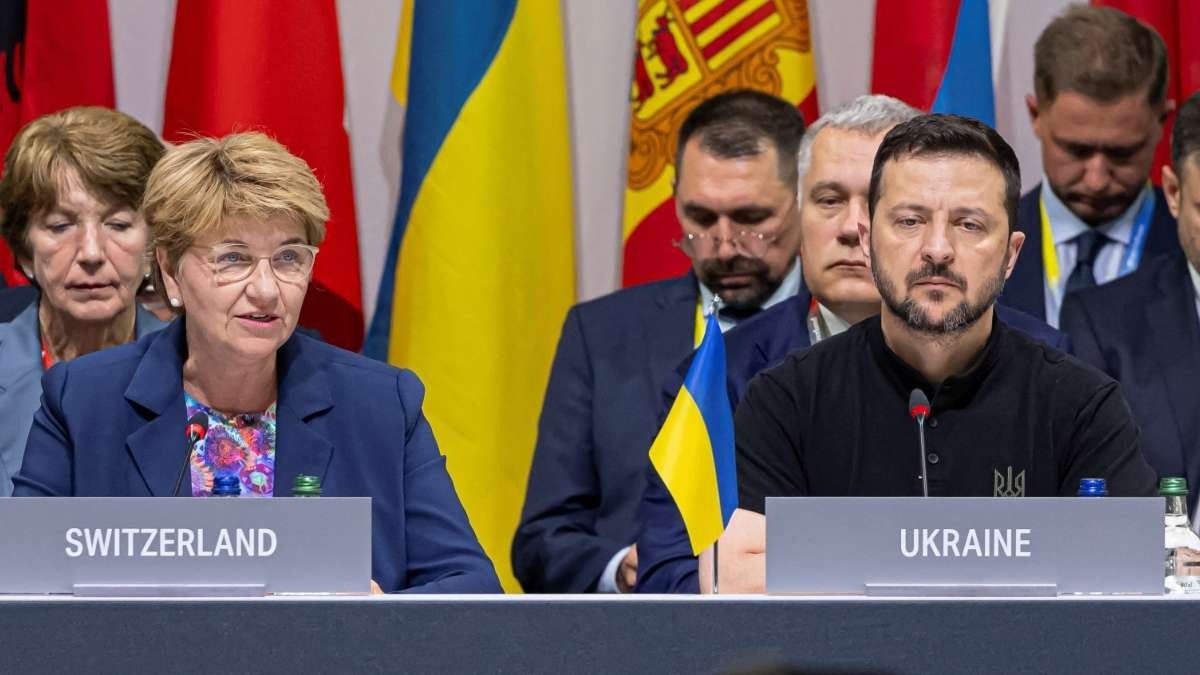Ukraine Peace Summit | Image:Reuters
New Delhi: As it was being speculated that not all participants at the Ukraine Peace Summit in Switzerland are expected to sign the final declaration, several countries including Saudi Arabia, India, South Africa, Thailand, Indonesia, Mexico, and the United Arab Emirates (UAE) on Sunday opted out of signing the final communique at the Ukraine Peace Summit in Switzerland. The Swiss government confirmed the course of events that took place during the summit. Pavan Kapoor, Secretary (West) of the Ministry of External Affairs led the Indian delegation in the discussions on the issue.
The Ukraine Peace Summit was hosted by Switzerland, which saw over 90 countries participating in the global event. Following the discussion during the summit, the Government of Switzerland said that over 90 nations took part in the talks, and the vast majority of them signed up to the communique.
Moscow Labelled Summit a Waste of Time
According to a list which the Swiss organisers posted at the close of proceedings, apart from Indian, Saudi Arabia, South Africa, Thailand, Indonesia, Mexico and the UAE, Brazil, which was listed as an “observer” on the list of attendees, also did not feature as a signatory.
Through the summit, the Western countries along with a few other countries are pushing for a consensus on how to end the war in Ukraine. However, a lack of clarity on whether future talks would involve Russia or not, a few nations expectedly refused to back its final conclusions, paving an uncertain path ahead.
Earlier, Moscow had called the summit a waste of time and instead put forward rival proposals.
About Ukraine Declaration
According to the draft of the final communique in the Ukraine Peace Summit, Russia’s Ukraine invasion was labelled as ‘war’, which Moscow has rejected. The draft also called for Ukraine’s control over the Zaporizhzhia nuclear plant and its Azov Sea ports to be restored. It also omitted tougher issues of what a post war settlement for Ukraine would look like, whether Ukraine can join NATO and what troop withdrawals from both sides would look like.
Reports suggest that the communique talks about the ongoing war, saying, “The ongoing war of the Russian Federation against Ukraine continues to cause large-scale human suffering and destruction, and to create risks and crises with global repercussions for the world. We had a fruitful, comprehensive and constructive exchange of various views on pathways towards a framework for a comprehensive, just and lasting peace, based on international law, including the United Nations Charter.”
In the declaration, it was also insisted that any threat or use of nuclear weapons in the context of the ongoing war against Ukraine is inadmissible and attacks on merchant ships in ports and along the entire route, as well as against civilian ports and civilian port infrastructure, are unacceptable.
The draft also talked about release of all prisoners of war and the active involvement of all parties in dialogue.
PM Modi Clarifies India’s Stance to Zelenskyy
On the sidelines of the G7 Summit, Prime Minister Narendra Modi met Ukrainian President Volodymyr Zelenskyy on Friday. During the meeting, PM Modi assured that India would continue to do everything within its means to support a peaceful solution to the Ukraine conflict and reiterated that peace can be restored only through dialogue and diplomacy.
The Ukrainian President also briefed the Indian Prime Minister on various aspects of the Russia-Ukraine war and the Swiss peace conference. The Ukrainian President had pushed PM Modi for months to attend the summit, although India had not provided any confirmation before. Zelenskyy on Friday confirmed that PM Modi has sent a high-level delegation to the peace summit and thanked him for it.
Talking about the Ukraine declaration, Ukraine’s peace plan launched by President Zelenskyy outlines 10 proposals that encapsulate the president’s step-by-step vision to end the full-scale invasion, which began in February 2022. The plan includes ambitious calls, including the withdrawal of Russian troops from occupied Ukrainian territory, the cessation of hostilities and restoring Ukraine’s state borders with Russia, including Crimea.
